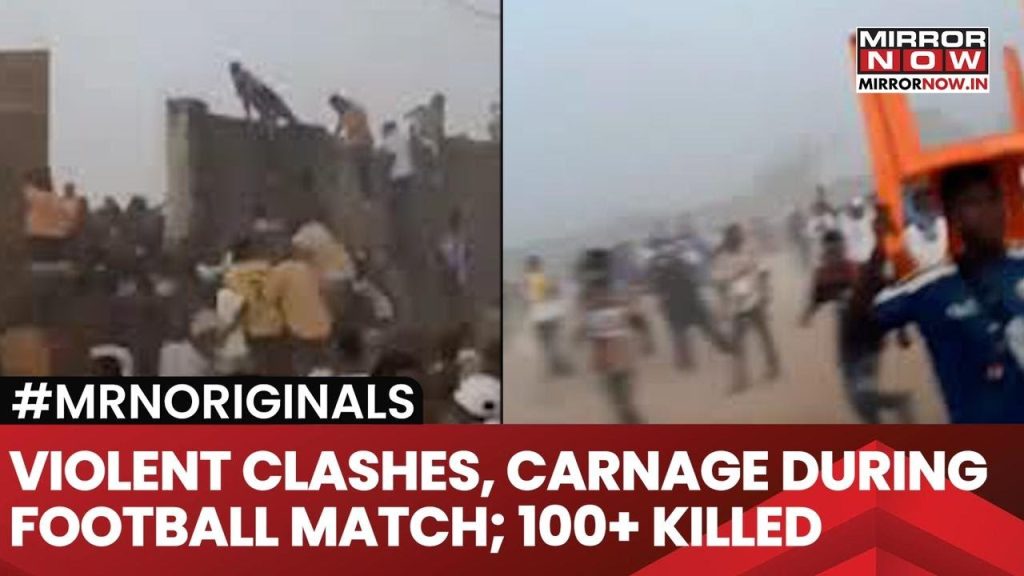
Mass carnage: Clashes at a football match in Guinea leaves dozens dead
A massive tragedy unfolded at a football match in Guinea, where clashes erupted between fans and security forces, resulting in dozens of deaths and many more injuries. This horrific incident occurred during a highly anticipated match, and the violence that ensued turned what should have been a celebration of sport into a deadly disaster.
Here’s an overview of the key details surrounding the incident:
1. The Incident
- Location: The tragic events took place at the Malabo Stadium in Conakry, the capital of Guinea. The match in question was part of a major domestic football competition, with thousands of fans in attendance.
- Initial Incident: The clashes reportedly began when a crowd surge occurred at the stadium entrance, leading to chaos and confusion. Some reports suggest that security forces, attempting to control the crowd, used force to disperse fans, which escalated tensions.
2. Death Toll and Injuries
- Dozens Dead: Early reports indicate that at least 50 people have been confirmed dead, with the toll expected to rise. Many fans were trampled or suffocated in the crowd, while others were injured in the confrontations with security forces.
- Thousands Affected: In addition to those killed, over hundreds of people were injured, some of whom are in critical condition. The injuries were primarily from stampedes, suffocation, and blunt force trauma.
- Aging Infrastructure: The stadium infrastructure was also said to have contributed to the chaos, as the gates and exits were inadequate for the large crowd, leading to further crowding and panic.
3. The Causes of the Clashes
- Crowd Overcrowding: The overcrowding of the stadium was a critical factor in the disaster. Fans attempting to enter the stadium during peak time faced significant bottlenecks, which led to increased tension and panic.
- Inadequate Security Measures: Many witnesses have pointed to inadequate security and crowd management. The police and security forces were reportedly overwhelmed by the massive turnout, and the response to the crowd’s movements was often violent.
- Fan Rivalries: Tensions between rival fan groups may have contributed to the escalation. Football fan violence is not uncommon, and it’s possible that heightened emotions led to clashes both inside and outside the stadium.
- Lack of Emergency Response: Reports suggest that the emergency response was delayed, and there were difficulties in evacuating injured people due to blocked pathways and overwhelmed medical staff.
4. The Aftermath
- National Mourning: The government of Guinea has declared a period of national mourning in honor of the victims. This tragedy has shocked the country, and calls for justice and accountability are mounting.
- Investigation Underway: Authorities have launched a full investigation into the cause of the incident and the role of security forces. There have also been calls for better crowd control measures to prevent such incidents from occurring again.
- International Condemnation: The incident has drawn widespread condemnation from international organizations and human rights groups, who are calling for reforms in stadium safety protocols and the treatment of football fans.
5. Impact on Football in Guinea
- National Football Authorities Under Scrutiny: The disaster has raised questions about the management of football in Guinea. Officials from the Guinea Football Federation are facing increasing pressure to ensure that similar tragedies do not occur in the future.
- Fan Culture and Safety: While football fans are passionate, incidents like this highlight the importance of fan safety and the need for improved measures in stadiums across the country. The use of better crowd control and safer infrastructure is essential to avoid such disasters in the future.

6. Calls for Reform
- Improved Stadium Infrastructure: Experts argue that the design of stadiums in Guinea and other parts of Africa must be reconsidered to handle larger crowds safely. This includes better access points, proper seating arrangements, and more exits for emergency situations.
- Enhanced Crowd Management: Calls are growing for trained professionals to manage large crowds in football matches. The use of technology and improved policing methods is vital to prevent panic and violence.
- Health and Safety Protocols: Medical response teams must be readily available and capable of responding quickly to emergencies. Evacuation procedures need to be well-planned and practiced, especially in high-attendance games.
7. The Role of the International Football Community
- FIFA’s Responsibility: The global football governing body, FIFA, has a responsibility to ensure that member countries comply with certain safety standards for fans attending matches. FIFA has expressed its deep sadness over the event and has offered support to Guinea in managing the aftermath.
- Support for Victims: International organizations, including the International Red Cross and UNICEF, have extended condolences and are offering support to victims’ families and survivors of the tragedy.